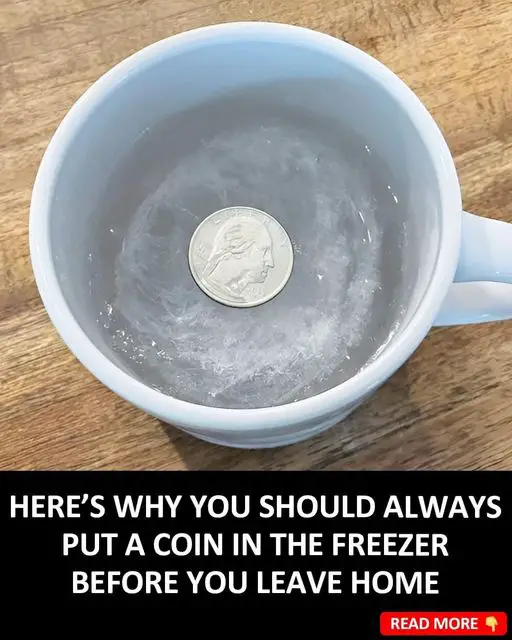
When you’re heading out for a vacation, there’s always a checklist of things to take care of before you go: packing, locking up the house, arranging pet care, and more. But there’s one potential problem that often goes unnoticed—the risk of a power outage while you’re away. Power outages aren’t uncommon, and though you might think they’re not a big deal, they can cause real problems, especially when it comes to your freezer.
What if your freezer thawed and refroze while you were away, leading to food spoilage? The idea of returning to a freezer full of spoiled food, especially after spending time and money on a relaxing vacation, is frustrating. Thankfully, there’s a simple and clever trick involving a coin that can give you peace of mind before you head out of town.
The Power Outage Problem
You might ask, “Why does a power outage matter, especially when it comes to my freezer?” Well, if your freezer thaws due to a power outage and then refreezes, some of the food inside might no longer be safe to eat. Certain types of food, particularly meat, can harbor dangerous bacteria like Salmonella or E. coli when they thaw and refreeze. If the meat in your freezer thaws completely and then refreezes, consuming it could lead to foodborne illness.
Even foods that don’t pose a risk of making you sick can lose their quality. For example, ice cream will develop ice crystals and lose its creamy texture, while other items may become soggy or lose their flavor. This is where the coin trick comes into play.
The Coin Trick
A simple way to detect if your freezer has thawed and refrozen while you were away is by using the “coin trick.” The hack is credited to Sheila Russell, and it’s a quick, easy solution for anyone who wants to ensure their freezer stays cold while they’re on vacation.
Here’s how it works:
- Take a plastic cup and fill it with water. Place the cup in your freezer and allow the water to freeze completely.
- Once the water is frozen, take a coin and place it on top of the ice.
- Leave the cup in the freezer while you’re away.
When you return from your vacation, check the position of the coin. If it’s still sitting on top of the ice, your freezer maintained its temperature the entire time, and all your food is safe to eat. However, if the coin has sunk to the bottom of the cup, it’s a clear sign that the ice melted at some point (meaning the freezer thawed) and the water refroze afterward, pushing the coin down.
This trick isn’t just useful for vacations—it can also help you monitor your freezer if you suspect it might be malfunctioning. If you notice the coin is no longer on top, it may be time to check if your freezer is working properly.
Why This Trick Works
The reason this trick is so effective is that the coin’s movement depends entirely on the water thawing and refreezing. Water, unlike some substances, expands when it freezes and contracts when it melts. This property makes the coin an excellent indicator of whether or not the freezer thawed during a power outage. When the ice melts, the coin sinks, and when the water refreezes, the coin stays at the bottom.
Additional Freezer Safety Tips
Beyond the coin trick, here are a few additional tips to keep your food safe during your travels:
- Use a Freezer Thermometer: Invest in a freezer thermometer that can help you monitor the exact temperature inside. Freezers should be kept at or below 0°F (-18°C). If the temperature rises above this, it could indicate a malfunction or power outage.
- Stock Your Freezer Wisely: Freezers perform better when they’re full. The more frozen items inside, the more efficiently the freezer can stay cold. If your freezer is empty or mostly empty, consider adding bags of ice or extra containers of water before you leave for vacation.
- Wrap Food Properly: To further protect your food from potential thawing and refreezing, ensure everything is well-wrapped and sealed tightly in freezer-safe bags or containers. This not only helps maintain food quality but also prevents cross-contamination in case of thawing.
- Leave Room for Expansion: Frozen liquids expand, so if you’re freezing any liquid-based items (like soup or sauces), leave some room in the containers to avoid messy spills during the freezing process.
What to Do If You Discover Thawed Food
If you return and find that the coin has sunk to the bottom of the cup, it’s crucial to check your food. Here’s how you can determine if your food is still safe to eat:
- Meat and Poultry: If the meat is still frozen solid, it’s likely safe to refreeze, though the quality may be compromised. However, if the meat has partially or fully thawed, discard it.
- Frozen Fruits and Vegetables: These are generally safe to refreeze if they haven’t spoiled, though they may lose some texture and flavor.
- Dairy Products: Foods like ice cream and frozen dairy items often lose their texture when thawed and refrozen. If these have thawed, it’s best to discard them.
Conclusion
The coin trick is an easy and effective way to ensure your freezer stays cold while you’re away on vacation. By simply placing a coin on top of a frozen cup of water, you can instantly tell whether a power outage caused your freezer to thaw. This simple hack can save you from potential food spoilage and provide peace of mind knowing that your food remains safe.
The next time you’re preparing for a trip, don’t forget to add this simple coin trick to your checklist—it might just save your freezer’s contents!



